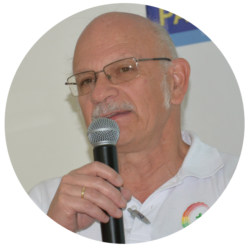Traditional and diverse knowledge
The standard processes and practices of knowledge production, preservation, compilation and consumption in the world are focused on Westernized and Anglocentric definitions and concepts of knowledge. These processes and practices determine who can participate in the knowledge production processes, who can contribute to the knowledge, as well as what knowledge is considered legitimate and valid. Likewise, it determines the policies for the creation and registration of knowledge and its forms of communication and dissemination.
The axis of traditional knowledge seeks to open a space for non-Western and non-Anglocentric sources and knowledge systems, on the subjects that produce them, their contributions and contents, as well as on the efforts we can make to facilitate free access to both these knowledge, such as that resulting from westernized systems of knowledge production, preservation and compilation. The more we open ourselves to that knowledge, the more people will know and benefit from it.
Leader

Rohini Lakshané is a technologist, Wikimedian, and public policy researcher. As an erstwhile Program Officer at the Centre for Internet and Society, India, she was one of the leaders of the Openness Track at the Global Congress for IP and Public Interest 2015.
Digital Rights
Disinformation processes online have been a concern in several countries in the past few years – and have become more central during the Covid-19 crisis, as social networks and messaging apps are used to spread all kinds of information around the virus and the pandemic in general. Ever since, social media platforms changed their policies to control more speech than before, and policies to tackle disinformation have been proposed in different countries.
Amidst these discussions, some stakeholders have been pointing to the European Union Copyright Directive as containing solutions for the “infodemia” – especially, its controversial Article 15, establishing the so-called “protection of press publications”. Australia’s push in the same direction is a remarkable current example. In this track, we will discuss how discussions about intermediary liability for copyright infringement relates to disinformation in general, and in particular the controversies around the solution represented by publishers’ rights.
Access to Medicines
Humanity is going through a situation that tests all the mechanisms that it has implemented to guarantee the dignity of people through the social pact of human rights. This moment of emergency situation surpasses health approaches and has exposed the fragilities in the social structures of hundreds of countries around the world.
Among the current challenges, there are drastic deficits in the number of qualified health personnel, hospital infrastructure and equipment, hospital beds and Intensive Care Units, personal protection supplies, supplies of reagents and useful materials for the development of diagnostic tests. reagents and swabs, medications and vaccines.
Ensuring access, the availability of health technologies including drugs and vaccines, and ethics in the development of experimental research in humans are more than ever a priority that requires efforts from all areas, including academics and civil society.
The line of access to medicines of the intellectual property week will bring some of the main topics of current exchange, with which it is intended to contribute to the global debate on the next scenarios of approach and treatment of COVID -19.
Leaders

Angela Acosta is the General Director of Misión Salud, a pharmacist at the National University (Colombia). Doctor (PhD) in Pharmaceutical Sciences and Master in Clinical and Health Effectiveness from the University of Buenos Aires. She worked as a Specialist in medicines and health technologies at the South American Institute of Government in Health ISAGS – UNASUR. Senior consultant in health issues and university teacher in recognized universities in Colombia.

Francisco Rossi is Doctor, epidemiologist, with extensive experience in international public health, especially in pharmaceutical policies, intellectual property and access to medicines. He was an advisor to the Ministry of Health in the negotiations of the Free Trade Agreement with the United States of America. He has worked as a consultant for international organizations such as PAHO and UNDP. Currently, he is Senior Advisor to the IFARMA Foundation
Copyright
Digital technologies have been successful in increasing the capacity of society to improve education, science and culture for all. However, barriers of different natures have not ceased to exist; an unbalanced copyright system is one of them.
Over the last decades, copyright reforms have been driven by private interests and increasingly harmed the public interest. An unbalanced system not only prevents users capacity to exercise their human rights, like freedom of expression and the right to access to education, culture and science, but it also threatens creativity and innovation, which has always strongly relied on access and the reuse of culture and knowledge. Copyright flexibilities have proven to be of key value to innovators and, therefore, for the development of countries’ digital economies.
Global discussions on copyright reform take place in very unequitable spaces, such as trade negotiations and international fora where civil society and the academica find little space to engage. Within national public policy debates, the copyright industry interests have frequently weighed over that of users. Over the last decades, they have pressed for international agendas of ever higher mandatory protections for authors and rights holders, whereas flexibilities and public interest guarantees are stated as non-binding language and left to the will of local legislators.
Under such context, open policies have proven to offer important solutions for access to knowledge, and although they can not reach the wide extension of access provided by copyright flexibilities, they should be promoted and highlighted.
In Latin America, State Copyright offices generally promote very protective visions of intellectual property, so much that public domain or flexibilities are scarce both in local legislations and in reform proposals. Traditionally, an important part of countries in the region has formed a progressive voice around balance in copyright in international fora, while that has not necessarily been translated into internal policies. Building a strong voice for the public interest from Latin America is essential for countering international maximization strategies in local copyright reforms, international organizations and trade agreements.
Trade Agreements
As trade agreements have evolved and gone beyond import tariffs and quotas into regulatory rules and harmonization, they have become a major source of international intellectual property legislation. Recent trade agreements also started to include digital policy chapters with far-reaching consequences for digital rights, privacy, technology and public policy. The role of trade agreements in international rule making can no longer be ignored. As multilateral negotiations become increasingly complex, protracted and broad in scope, it is crucial that our community is informed, engaged and aware of the important role they need to play. To do this effectively and efficiently, there is a need for coordination and collaboration. Trade advocacy requires a holistic approach and response.
This cross cutting track aims to “connect the dots” for the participants, educate them about trade agreements and foster understanding and interconnection between different tracks. it will identify possible intervention strategies and targets and develop action plans for each thematic line.


